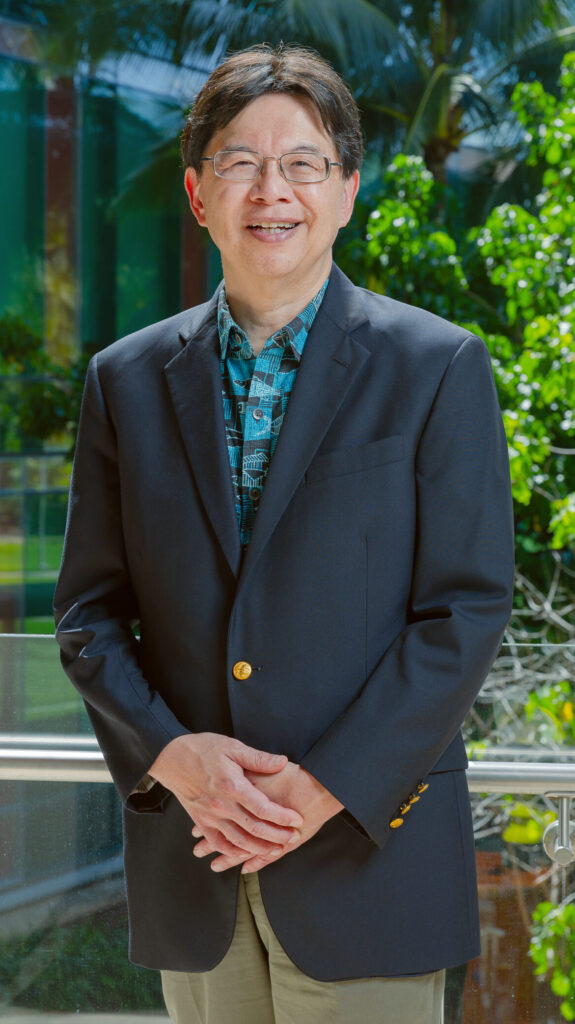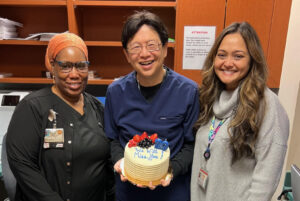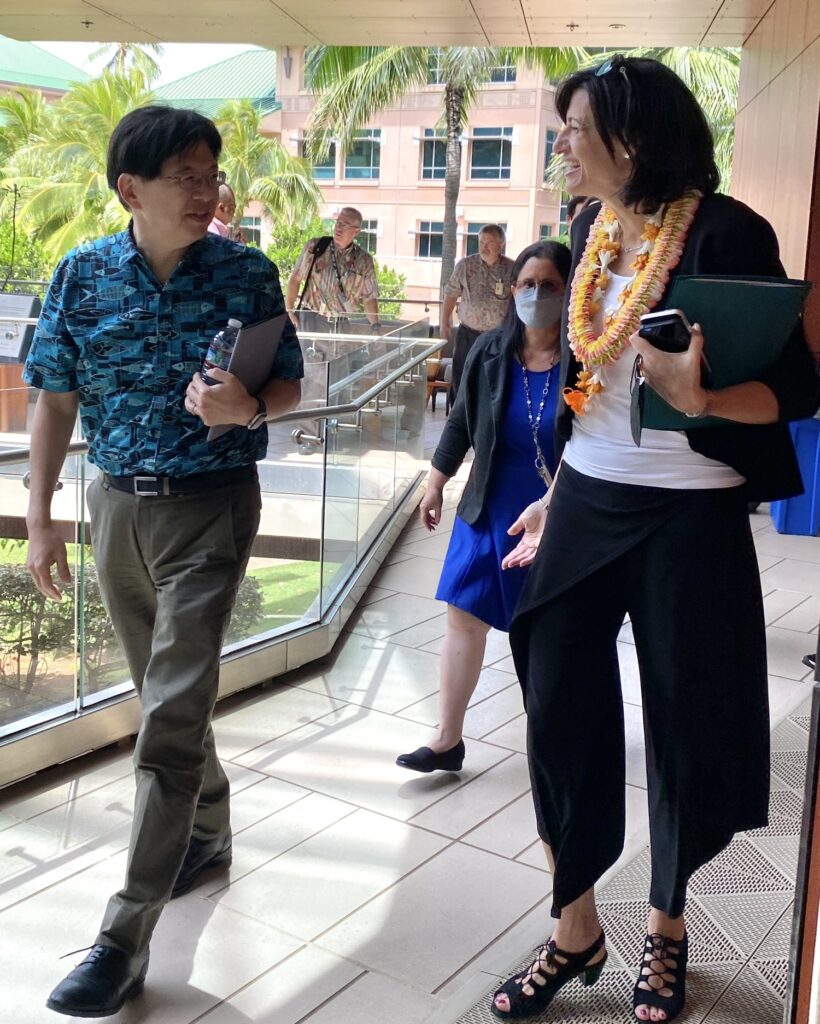Naoto T. Ueno, MD, PhD
CHANGE CAN SOMETIMES BE GOOD, SOMETIMES IT CAN BE BAD, and sometimes it is necessary.

For noted cancer researcher and educator, Naoto T. Ueno, MD, PhD, his huge moment of change came when he decided to leave behind a distinguished 30-year research and administrative career at The University of Texas MD Anderson Cancer Center to become director of the University of Hawai‘i Cancer Center (UH Cancer Center). Ueno, who started in December 2022, most recently served as executive director of MD Anderson’s Morgan Welch Inflammatory Breast Cancer Research Program and Clinic in Houston, which flourished under his watch to become the world’s largest and most-renowned for treating the rare disease.
While it may be difficult for some to understand why Ueno would seemingly leave at the height of his tenure, Ueno is a firm believer that “Change” is necessary.
Change is nothing new for Ueno, who, at age seven, moved from Japan to the United States when his father, a chemist for a Japanese rubber company, was sent to Akron, Ohio. Upon returning to Japan for high school, Ueno realized that his intended career path of serving in political science or the military required a high skill level in linguistics, which he lacked due to his extended time in America. Forced to make another change, Ueno elected to pursue science.

He eventually ended up in medicine and graduated from Wakayama Medical University, where he also completed his fellowship at the U.S. Naval Hospital in Yokosuka. Ueno went on to complete his internal medicine residency at the University of Pittsburgh School of Medicine and his medical oncology fellowship at The University of Texas MD Anderson Cancer Center. He received his PhD in cancer biology from the University of Texas Health Houston Graduate School of Biomedical Sciences.
“I decided to leave MD Anderson because it was time for me to expand my leadership skills and to test things that I learned about my research on a grander scale,” said Ueno. “I feel you shouldn’t be in the same position for too long. Good things will happen there because I left, and similarly, I expect good things to happen here now that I’m at UH. Change can cause confusion and chaos, but it can bring exciting new changes that will benefit the team and the community.”
With the UH Cancer Center, Ueno takes the helm of the only National Cancer Institute (NCI) designated cancer center in Hawai‘i and the Pacific and one of only 71 centers in the United States, with strengths in diversity, population science, and cancer biology. It is also home to the acclaimed Multiethnic Cohort Study. This epidemiological study assesses the development of cancer and other chronic illnesses of over 215,000 participants, including men and women in five main ethnic groups: Japanese Americans, Native Hawaiians, African Americans, Latinos, and Caucasians.
“Hawai‘i has the world’s largest catchment area and its central location allows the UH Cancer Center to address a number of health equity issues that many patients face in cancer treatment and prevention,” said Ueno. “We want to be a role model in this capacity and to uniquely position ourselves as a hub connecting the U.S. to Asia. I will work to strengthen our team and research scope further so that people feel the UH Cancer Center is worth investing in.”
One of these strengths is the Early Phase Clinical Research Center (EPCRC), which is scheduled to be completed in 2024. The $13 million, first-of-its-kind center in Hawai‘i, will provide cancer patients with access to Phase 1 and possibly Phase 2 clinical trials without having to travel to the U.S. mainland for specialized treatments. These trials involve cutting-edge, experimental treatments recommended to patients who are not responding to standard treatments or have a more challenging type of cancer.

“Currently, patients with advanced diseases have to leave the islands for specialized treatments, and if they can leave, they are very fortunate,” said Ueno. “However, most patients are unable to leave, so they end up completing their treatment earlier than necessary.”
As a two-time cancer survivor, Ueno has a strong conviction about science and the impacts that both have on the patient and the community. Interestingly, Ueno was involved in the development of some of the drugs that were later prescribed to help him battle the disease.
“I’m healthy and alive because somebody spent a lot of money to conduct research and develop new treatments,” said Ueno. “I’m here today because of clinical trials and other scientific discoveries that allowed me to receive the necessary drugs I needed to fight my cancer and survive.”
When the EPCRC is up and running, Ueno will be looking at attracting more Phase 1 trials to the state to help narrow the health equity gap surrounding cancer treatment and prevention. To do so, he will be seeking to develop a deeper relationship between the UH Cancer Center and the Hawai‘i Cancer Consortium. Established in 2010, this partnership enables the UH Cancer Center and John A. Burns School of Medicine to provide clinical affiliations with Hawai‘i’s four healthcare systems: The Queen’s Health Systems, Hawai‘i Pacific Health, Kuakini Medical Center and Adventist Health Castle, plus health insurer HMSA.
In addition to the clinical trials, Ueno’s vision is to create a truly cohesive patient-centered oncology care system in Hawai‘i that improves their quality of life through supportive care at all levels with academic clinical oncologists providing the necessary training to the community and health system physicians. With the establishment of a medical oncology fellowship, Ueno hopes that the UH Cancer Center will be able to train and retain more cancer specialists to work here on the islands to provide patients with equal access to leading-edge cancer treatments and care.
“My job at the UH Cancer Center is to ensure that people receive the highest quality care regardless of their location,” said Ueno. “We will impact not only patients in Hawai‘i and the Pacific, but also internationally.” Change is here for the UH Cancer Center and the future of cancer care in the state is looking pretty good.

